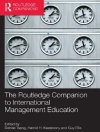Although academic freedom in teaching and learning methods is crucial to a nation’s growth, the concept comes with numerous misnomers and is subjected to much academic debate and doubt. This volume maps out how truth and intellectual integrity remain the fundamental principle on which the foundation of a university should be laid.
Seeking to widen the frontiers of academic freedom, the authors serve up a diverse range of case studies and examples of real-life practice to encourage readers to recognize the importance of the academic freedom of faculty and students, and acknowledge this freedom as one of the main goals to be achieved by any university. Ultimately, the authors demonstrate that the autonomy to work freely remains the foremost criterion of success, that it is a pre-requisite to facilitating the advancement of knowledge and quality of research in any institution of higher education, and is to be encouraged and supported by the leadership teams within those institutions.












